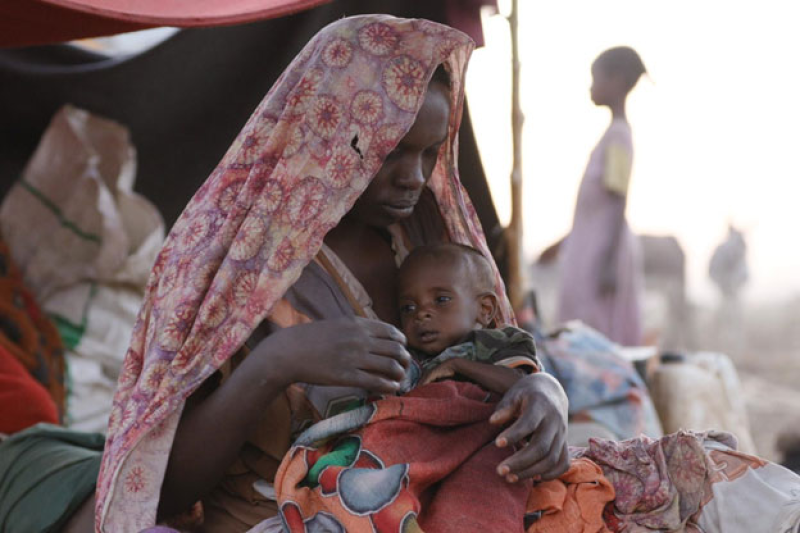- India Sees 9% Drop in Foreign Tourists as Bangladesh Visits Plunge |
- Dhaka Urges Restraint in Pakistan-Afghan War |
- Guterres Urges Action on Safe Migration Pact |
- OpenAI Raises $110B in Amazon-Led Funding |
- Puppet show enchants Children as Boi Mela comes alive on day 2 |
Violence Rises in Sudan as Humanitarian Aid Struggles

A Sudanese mother and her child at a shelter in Tawila, North Darfur.
Earlier this month, Sudanese civilians faced a sharp escalation of hostilities, with recent attacks by the Rapid Support Forces (RSF) and Sudanese Armed Forces (SAF) claiming dozens of lives. Amid growing needs and severe funding shortages, the United Nations and its partners have struggled to deliver adequate humanitarian aid.
On July 23, the RSF launched an assault on the Brima Rashid area in West Kordofan State, firing indiscriminately at homes and a market. According to the Office for the Coordination of Humanitarian Affairs (OCHA), this attack killed over 30 people and severely injured 40, many of whom were women and children.
“Medical sources report many wounded require urgent surgery,” said Farhan Haq, UN Deputy Spokesperson, emphasizing the urgent need for a ceasefire and safe access for humanitarian aid.
Between July 10 and 13, the RSF attacked North Kordofan’s Bara locality, with estimates of civilian deaths ranging from 60 (UN) to 300 (independent groups). Meanwhile, the SAF conducted airstrikes on villages including a school used as a displacement shelter, killing over 20 people, and attacked families in Bara, killing at least 11 civilians.
UN High Commissioner for Human Rights Volker Türk warned that escalating violence in North Darfur and Kordofan will worsen the humanitarian crisis and urged all parties to respect international law and protect civilians.
As of mid-July, more than 3,400 people were internally displaced in North Kordofan, with flooding adding 400 more displaced. Many now live with host communities lacking access to basic services such as food, water, shelter, and healthcare.
The Tawila locality of North Darfur hosts over 560,000 displaced people but faces critical shortages in water, sanitation, and hygiene facilities, raising fears of cholera outbreaks. Over 1,300 cholera cases and 18 deaths have been reported nationwide, with nearly 40% in Tawila.
Food insecurity is worsening, with prices of essential staples rising sharply due to flooding and supply disruptions, especially in South Darfur. Famine has been confirmed in 10 Sudanese states, affecting nearly half the population. Women-headed households face the greatest food insecurity, doubling from 14% in 2024 to 26% in 2025.
The fragile healthcare system has been severely impacted, with over 32 health facilities closed and shortages of vaccines, medicines, and equipment. Thousands lack access to life-saving care.
A joint report by UNHCR and IOM noted that approximately 320,000 Sudanese refugees returned from Egypt and South Sudan last year but face severe challenges accessing basic services amid destroyed infrastructure.
UN officials stressed the urgent need for funding and peace to prevent further deterioration. An estimated $4.2 billion is needed for aid operations, but only 23% has been funded so far, threatening future aid delivery.
Humanitarian leaders called for stronger international solidarity to support Sudanese people affected by the conflict and the countries hosting displaced populations.

